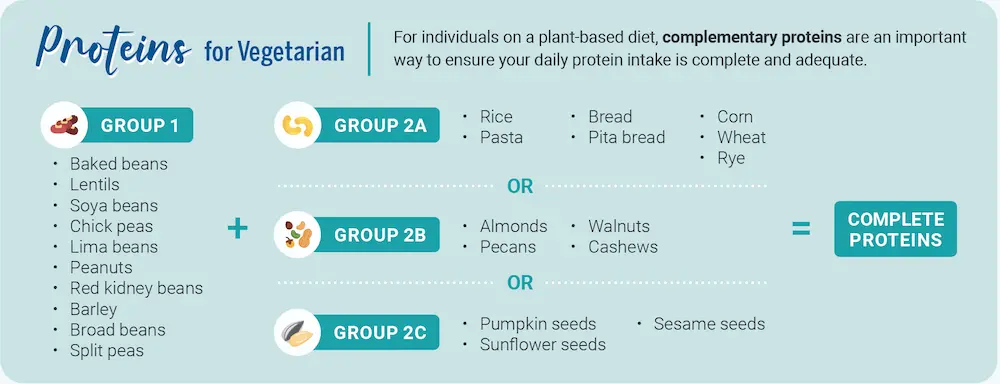News & Articles

Fad or Facts: Vegan and Plant-Based Diets

For some, adopting a plant-based diet is not just a dietary choice, but a lifestyle choice as well. In this article, Senior Dietitian Gerard Wong explains more about plant-based diets and the health benefits associated with them.
Sustainability is becoming a hot topic around the world. More and more individuals are making the switch to plant-based diets to help reduce and offset carbon emissions generated by the meat and dairy industry.
But firstly, what types of plant-based diets are there?
A vegan diet is a plant-based diet that focuses on plant-based sources such as vegetables, grains, nuts, fruits, and foods derived from plants. Compared to a vegetarian diet, a vegan diet excludes meat, poultry, fish and dairy products—including eggs. Some individuals may adopt a vegan diet for religious reasons, while for others, the goal may be to promote a sustainable lifestyle that ultimately works for the betterment of the environment.
Vegetarianism on the other hand can refer to a movement where you proportionately choose more of your foods from plant-based sources as opposed to meat sources.
Health benefits of plant-based diets
There have been many studies over the years purporting the health benefits of plant-based diets, from the Seventh-Day Adventists1 study, to the widely known Mediterranean diet, where plant-based foods—such as whole grains, vegetables, legumes, fruits, nuts, seeds, herbs and spices—are the foundation of the diet, and olive oil is often the main source of added fat.
In general, plant-based diets have been associated with a lower risk of death from ischemic heart disease2. Vegetarians also appear to have lower low-density lipoprotein cholesterol levels, lower blood pressure, and lower rates of hypertension3.
The findings are not surprising, as an increase in plant-based foods would no doubt result in a diet that is lower in saturated fat and cholesterol, and higher in antioxidants and dietary fibre—all of which are associated with increased life expectancy and a reduced risk for many chronic diseases, including cancer.
However, it is important to note that unlike meat, many plant-based proteins are considered incomplete. This means that they may not contain all 9 essential amino acids that the body requires. Individuals adopting a plant-based diet must therefore ensure that they eat a good variety of plant-based foods in order to achieve the same effect (see diagram).
Individuals adopting a true vegan diet (where eggs and dairy are omitted) must also ensure that they are getting sufficient vitamin B12, calcium, iron and zinc.
The rise of plant-based meats
Advancements in food processing techniques have resulted in the development of plant-based meats with improved nutritional quality and taste. These new products have made it easier for individuals looking to switch to plant-based diets or adopt more plant-based foods into their diet.
Here is a look at some of these plant-based meats:
Mock meats have been around for ages in Asia. They are typically made from wheat gluten. These traditional mock meats can often be found in canned vegetarian products.
However, it must be noted that traditional mock meats are highly processed, offer lower nutritional value, and often do not taste like real meat.
Quorn is made from mycoproteins, a form of protein extracted from a fungus. It is then mixed with wheat flour as a binder among others.
Rehydrated egg white is also used in most of their products. It may therefore not be entirely suitable for individuals on a vegan diet.
Other plant-based meats available as mince and found in most local supermarkets include Meat Zero™, Impossible Meat™, Beyond Meat™, and Omni™ meat. These plant-based meats are often lower in sodium and can be used as a direct meat substitute to any of your current recipes.
Karana Mince™ (only available at restaurants) is another interesting meat alternative as it uses jackfruit and pea protein to formulate its ‘mince meat’.
There are other plant-based meat alternatives available for individuals looking to switch to a plant-based diet. However, these only come in products such as nuggets, luncheon meat or fish sticks, which are often high in sodium (i.e. salt). Some of these products include: Happiee™ (patties, fish sticks, nuggets), First Pride™ (nuggets, strips, popcorn), Arlene™ (plant-based meals using Omni™ meats), and Anew™ (luncheon meat).
If you are looking to switch to a plant-based diet or adopt more plant-based foods into your diet, it is always good to start with beans and legumes, vegetables and fresh fruits. Switching from animal meat to plant-based meats may offer some variety to the diet, but these alternatives remain highly processed in order to achieve the meat ‘look and feel’. As such, they also tend to be higher in sodium.
Vegan diets and cancer
Generally, plant-based diets are safe for cancer patients.
However, patients with estrogen receptor (ER) positive breast cancer may be concerned with the high use of soy products in many new plant-based offerings.
The nutritional needs of patients receiving cancer treatment may also differ from patient to patient. These patients may need to modify their diet depending on their individual condition and treatment plan.
Patients experiencing side effects such as unwanted weight loss, difficulty chewing or swallowing, and digestive issues such bloating, constipation or diarrhoea, may need to take alternative steps to manage their condition.
If you are undergoing cancer treatment, it is best to seek the advice of a dietitian for your individual nutritional needs.

1Seventh-Day Adventists are a religious sect. About 40% of members are vegetarian
2https://www.ncbi.nlm.nih.gov/pmc/articles/PMC8387295/
3https://pubmed.ncbi.nlm.nih.gov/19562864/
| POSTED IN | Cancer Prevention, Nutrition |
| TAGS | cancer diet & nutrition, healthy food & cooking, healthy lifestyle, misconceptions |
| PUBLISHED | 01 April 2023 |
